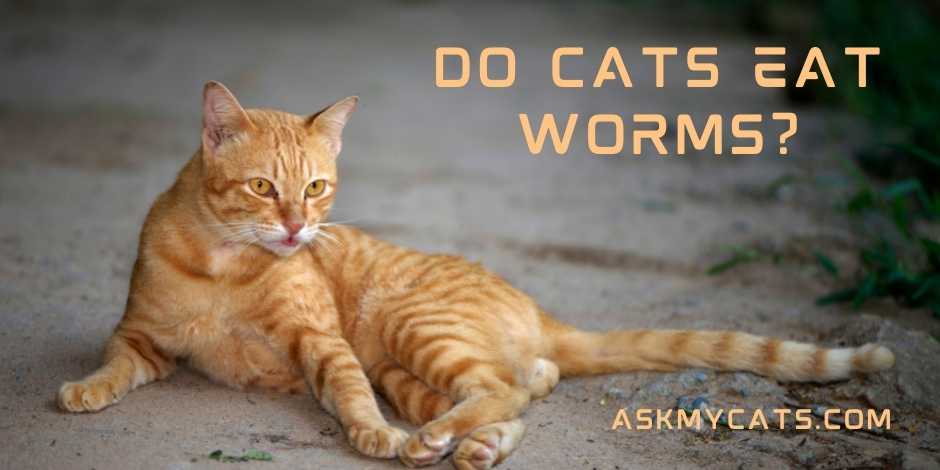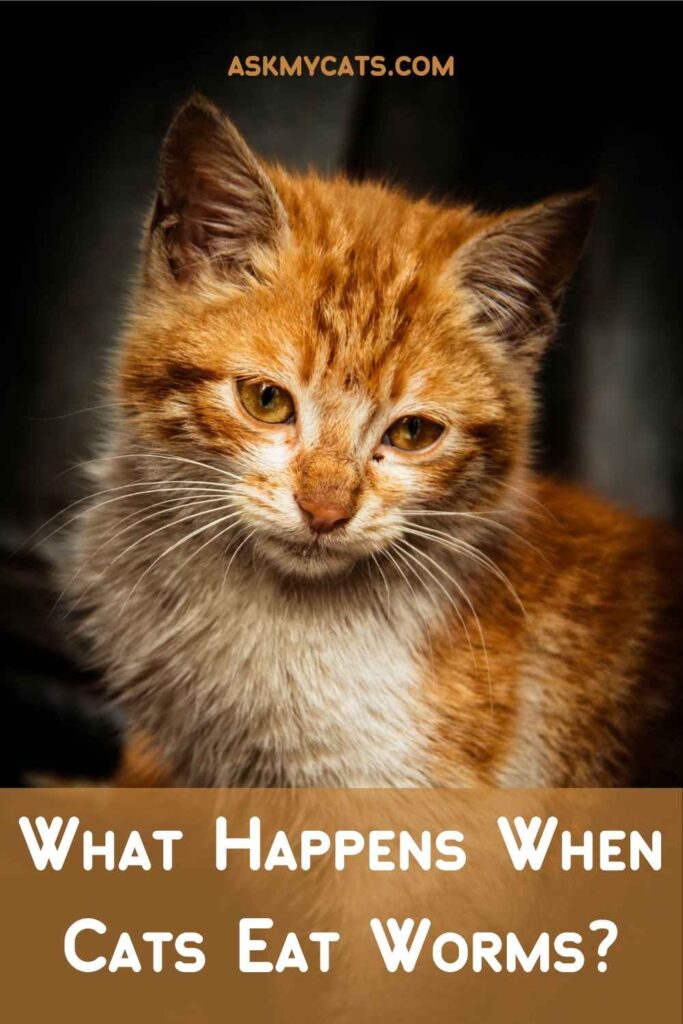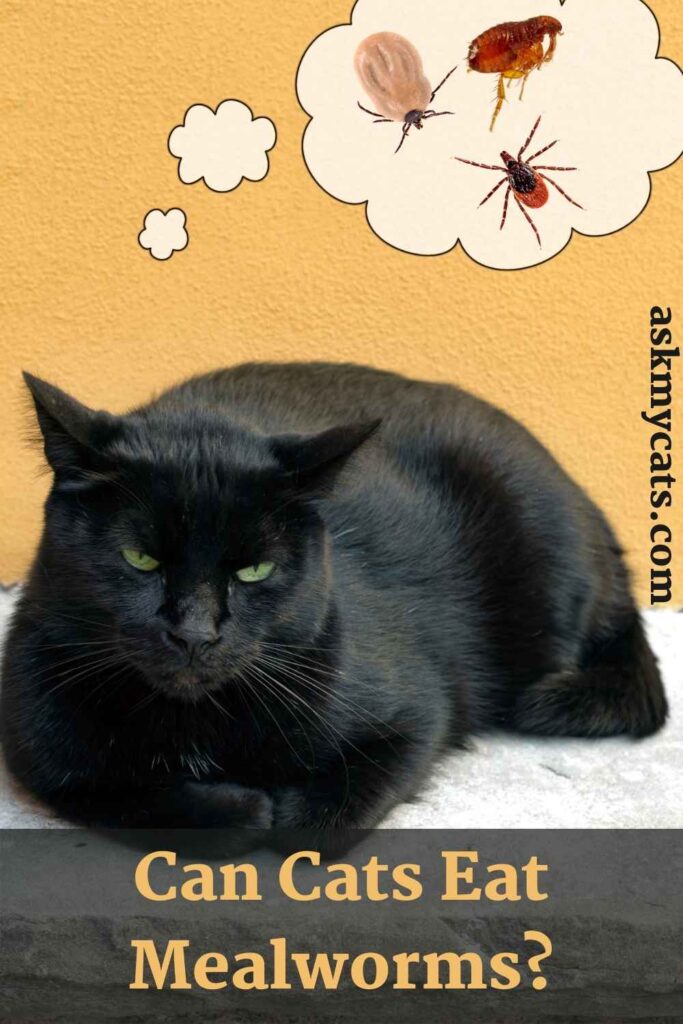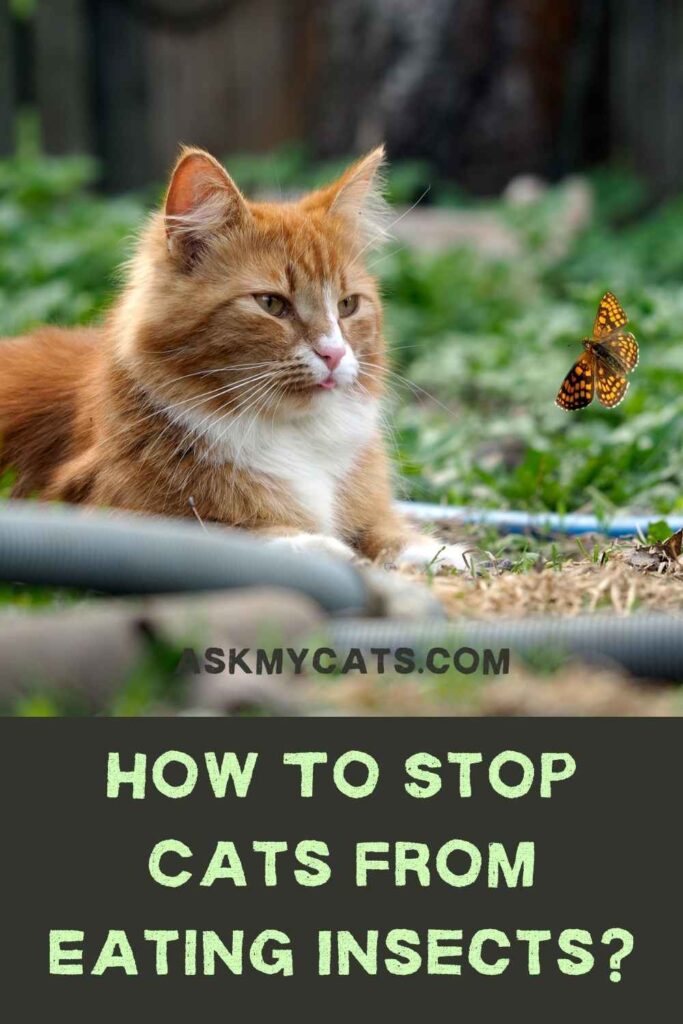If your cat is outdoors, everything they can find, like grass, rodents, butterflies, frogs, and even earthworms, can seem like fair game for a short snack.
Certainly, worms aren’t on your afternoon snack menu, are they?
Cats, on the other hand, may be drawn to worms and may find catching the worm a game. Do cats, on the other hand, eat worms?
Cats can eat worms because their movements attract cats and they are often used as toys rather than food. Eating worms will put cats at risk of contracting parasites like Capillaria.


Give Your Cat the Perfect Day
Get the Free Ebook!
Can Cats Eat Worms?
Cats will – and do – consume worms they encounter outside, despite the fact that they usually shouldn’t.
Your cat isn’t the only feline that eats worms like a bird, believe it or not. It’s something that a lot of cats do, but don’t call the vet right away.
Don’t get me wrong: watching your cat eat a worm isn’t fun. Your pet, on the other hand, does not seem to be aware of this.
I don’t know about you, but I’d like my cat to eat a worm instead of a bird or a rabbit. It means I’ll get to do less cleaning (and less mental scarring). Sure, I’d prefer my cat eat dry cat food, but if I had to pick between the two, I’d go for a worm outside.
Worms, particularly the larger ones, are visually appealing to cats. They move their bodies in a full range of motions, which a cat can easily adapt to.
The most of the time, a cat will scratch and bite the worm. If your cat has already eaten for the day, it is likely that they will not consume it.
What Happens When Cats Eat Worms?
Eating a worm would not have any possible negative consequences for your cat, contrary to popular belief.

When your cat eats something it isn’t used to, it can get sick almost immediately. Whether your cat has a strong gag reflex, you won’t even notice if he or she has snatched a worm when you’re not looking.
Since there is no venom or pesticide, there is no risk of your cat being poisoned.
It’s possible that your cat is vomiting after eating grass if he’s still outside. You will not be able to pinpoint just what caused your cat to vomit unless you closely monitor and know everything it does. But, at the very least, he puked outside hopefully, indeed.
Worms in cats and kittens are very common, and although they can be a source of worry for owners, they seldom cause major problems and are simple to handle.
Your veterinarian will examine your pet thoroughly and take a detailed medical history from you. The majority of healthy animals will have no signs of worm infection.
Kittens with a high worm burden can become ill, and roundworms may be present. Owing to the large number of worms, they can develop a pot belly in extreme cases.
Tapeworms, which look like flat grains of rice and can be seen rolling along the cat’s feet, are often found in faeces or around the cat’s bottom.
Roundworms are long, fluffy, and spaghetti-like in nature and feed on the infected cat’s nutrients. It’s really good for the vet to see any worms you’ve identified so they can recognise the form.
Are Worms Poisonous To Cats?
While worms are not toxic to cats, they can cause parasites if they are consumed.
There is no evidence that worms or earthworms are poisonous to cats. Eating a worm does not have the same effect on your cat as if your cat ate a poisonous herb, for example.
Worms, for example, do not emit chemicals that will cause your cat to vomit or, worse, die.
Eating worms, like anything else, comes with certain risks, even though it doesn’t result in a serious reaction. Eating earthworms can cause your cat to contract Capillaria, an internal parasite. Try saying that three times quickly.
Cats are hunters, and their bodies are designed to consume worms and insects. This is something they can easily digest.
In reality, I believe that keeping a feral cat colony is the reason I don’t have the bugs and scorpions that my neighbours do. The stuff is eaten by cats, and I’ve seen them do it. I’ve seen them trap moths in the air, which is pretty amazing.
So, if your cat ate a worm, scratch their neck and say “sweet kitty” before going on your day.
Can Cats Eat Mealworms?
Mealworms can be consumed by cats. Since the risk of these worms is minimal, there is no harm in feeding your cat a high-protein diet.

Mealworms, on the other hand, can be repulsive to certain cats due to their odour.
However, rather than an intrinsic difference, it is primarily determined by the cat’s personal decisions.
Are mealworms harmful to cats? Certainly not!
Cats are predatory creatures who like eating small prey such as insects and worms. They get a lot of protein from these as well.
Mealworms have a protein content of 15 to 20%. Cats are also used to consume insects and worms.
According to new research, experts in the United Kingdom are advising pet owners to feed insect protein-rich diets to their cats and dogs. They say that insect-based diets are safer for your pets than steaks.
So, you can buy dried mealworms for your cat from a legitimate shop or online, just make sure they are well fed.
When you get pet food from somewhere, it can contain polluted elements, which may cause stomach problems and even worms.
So be cautious. These are sold as lizard and other small animal food, but if of high quality, they can also be fed to cats.
Do Cats Eat Earthworms?
Cats consume earthworms. Cats can become infected with parasites such as Capillaria if they consume earthworms.
Earthworm vibrations lure cats, which like to play with them rather than eat them.
While you obviously don’t want to feed earthworms to your pet, they aren’t the most bad food your cat might eat.
However, as in something international, your cat eating earthworms poses certain dangers that you can stop for the sake of your cat’s welfare.
Limiting your cat’s ability to consume earthworms will reduce the risk of Capillaria infection. Earthworms are often the cause of Capillaria infection.
People are not infected with capillaria. Humans can produce parasites that are similar to Capillaria (for example, pinworms), but these parasites are species-specific and cannot be spread between humans and their cats.
Can Cats Get Capillaria?
Cats can develop Capillaria. Capillaria is more prevalent in dogs than in cats, but your cat could contract the parasite.
Capillaria is a microscopic parasite that most often attacks the bladder or respiratory tract. Capillaria is normally acquired from the air by your pet.
The Capillaria parasite, for example, may lay eggs in your backyard soil. Your cat can go outside and do whatever it wants (whatever that is), and the parasite eggs can get trapped on its paws.
When the cat enters, he starts cleaning his paws and settles in to clean himself for the next two hours. That means he’s inadvertently ingesting parasite eggs without anyone noticing.
When your cat is outside, keep an eye on them. As a general rule, please bathe your pet when they’ve been outside and you think they’ve worked themselves into something they shouldn’t have.
Capillaria may affect your pet and you might not even know it because it rarely causes cats to become physically ill.
If your cat has Capillaria, you might find blood in his urine if the parasite is in his kidneys, or wheezing and coughing if the parasite is in his lungs. In this case, the pet is unlikely to become violently ill.
You shouldn’t be overly concerned if your veterinarian diagnoses your cat with Capillaria. All you have to do is administer a dewormer to your pet, which is easy enough.
You won’t have to think about wrangling your pet to squirt medication into its mouth even more dewormers operate after a single injection.
Can Capillaria Be Prevented?
The only way to save your cat from getting Capillaria is to make sure he doesn’t eat earthworms.
You won’t be able to do much if your cat steps on parasite eggs and eats them. However, you can save your cat from getting parasites by making sure it doesn’t eat something it shouldn’t outside.
Your cat can consume fewer eggs if it steps on eggs than if it eats an earthworm (or more than one).
I understand that keeping an eye on your cat when it is outdoors is inconvenient, but it is necessary in order to protect your pet from being sick.
Even if the chance is remote, I don’t want my cat to get sick, so it’s best to prevent it from happening.
What If My Cat Eats Other Bugs?
Other insects, such as gnats or flies, may be pursued by your pet, but those insects often pose a minor danger, and may include parasites.
When my cat is indoors, she despises the bugs that zip around her. If there are gnats all around her, she wants to eat them up.
My other cats run about the house chasing flies as if their life depended on it. I have to admit that having a live-action fly swatter around is pretty handy, but cats eating insects isn’t ideal.
Other insects do not transmit Capillaria to your pet, but bugs may transmit a variety of parasites.
These parasites, like Capillaria, are harmless, but it’s always a good idea to keep your pet from consuming insects to prevent any pain.
How To Stop Cats From Eating Insects?
Of course, there are certain things you can do to keep your cat away from mosquitoes and earthworms.

Insect repellent spray Exterminators will spray your yard and get rid of insects like ticks and fleas if you employ a decent one. Redirect your cat’s focus.
If you see your cat chasing flies or worms, grab his or her favourite toy.
Keep the cat inside the building. If you keep your cat indoors, it will be difficult for him to find insects, especially worms (whether he likes it or not).
Make a landscaping change. For anyone with a small yard, this is potentially the best choice. You should replace the grass with bricks, which could attract less animals.
Make sure your pet is well-behaved. I understand how difficult it is to stop a cat from doing what it wants, but sternly calling your cat’s name can deter your cat from eating bugs.
Even though eating earthworms is unlikely to cause harm, it’s probably best if your cat doesn’t eat them or any other insects for that matter.
Your cat can stay well, have a good coat, and live a happy life if you feed him a well-balanced diet. Who wouldn’t want anything like that for their closest (furry) friend?
Frequently Asked Questions
Do worms stop a cat from eating?
Worms can cause weight loss, a bad hair, and fatigue, and extreme appetite, loss of energy, diarrhoea, and sickness in felines with more severe cases. A worm-infested cat can consume more food than normal but also lose weight, and excessive diarrhoea may cause the cat’s bottom to become sore.
How do cats act when they have worms?
Cats also have no symptoms at all, although there are a few things to watch out for: Appetite increase. Cleaning or wiping the field near its bottom excessively. In the fur along the feet, there are small worm segments or rice-like seeds.
Can worms kill cats?
Roundworms aren’t especially dangerous to adult cats, but in large numbers, they can pose a life-threatening danger to kittens and elderly cats.
Final Words
Cats may consume a variety of insects and worms, but keep in mind that not all bugs and insects are the same.
Read before encouraging your cat to eat something small and runs.
If you see any troubling symptoms or unusual activity, contact your local veterinarian right away.
If you are certain that these are symptoms of poisoning, contact the poison hotline as well.
